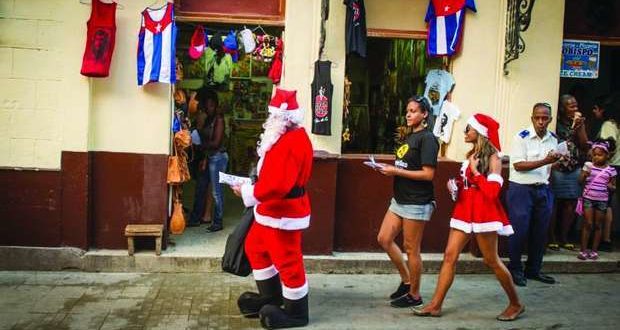
Ivan Garcia, 23 December 2016 — Every time Christmas approaches the private restaurant managed by Leonel, south of Havana, overflows with decorations and lights on the facade and over the door.
The staff don red caps threaded with white and the music resonates in the doorway. The smell of turkey and roasted pig awaken the appetite and invite you to come in and have a look at the menu. The relaxed atmosphere reminds us that the end of the year is approaching.
December is the most anticipated month in Cuba. People relax and even say good morning when riding in a collective taxi. Retirees and housewives are starting to line up at the state markets, to see if they can buy the pound of pork a little cheaper. Citizen criticisms increase because of food prices. And a large segment of the population can only look at the nougats, ciders and clusters of grapes in the “shoppings” — a word Cubans use in English — or in the hard currency stores.
But if there is a month when the city becomes a cornucopia it is in December. Reggaeton, timba and the lilt of salsa is heard wherever you go.
This year is different. By official decree, public festivities are suspended until further notice. Fidel Castro is not here, but his shadow remains, regulating the national life as if he were a traffic light.
The families with full pockets, who normally celebrate with Christmas dinner on Christmas Eve and during the days of Christmas drink a collection of drinks and beer between the din of music and mutual congratulations, have had to change their plans.
“We have to be quiet. We can not show jubilation even on December 31st. It’s shut down. Fidel couldn’t die another time?” asks Raidel, an artisan, who along with his family likes to welcome the coming of the New Year in grand style.
According to Eladio, manager of a nightclub west of the capital, “We received a circular that clarifies that we should stop the sale of alcoholic beverages and music on those dates. When Fidel died, on November 25, we were closed for nine days. That affects the pocket of employees, because the profits depend on sales. They even have scheduled inspections without warning, to see if they can catch us off base. If there are no drinks or cash, you can forget about it.”
An official from the Young Communist Union said, “People on the street are exaggerating. There’s no ban on parties, it’s because of the pain our people are feeling for the death of the comandante, that we ask them to be discreet about the celebrations. It’s true that the state establishments won’t have any parties, there won’t be any orchestras or dancing. People can celebrate at home, but with the music turned down low.”
“I would really miss it if I couldn’t celebrate Christmas Eve, Christmas and could see in 2017. Mourning for Fidel was nine days, people said their goodbyes, some cried, others didn’t. But now we must turn the page. I hope that now the police, the extremists and the intransigents of old don’t get into a big drama over people having fun and they feel they have to repress them,” says Oscar, a resident of the Lawton neighborhood.
If we give credit to the state ukase, each provincial government has the power to regulate the prohibitions according to the peculiarities of its municipalities. “It is not the same as it is in neighborhoods like Plaza de la Revolución, Playa or Old Havana, where thousands of tourists and foreigners circulate. In neighborhoods like San Miguel del Padrón, Arroyo Naranjo or Diez de Octubre there are no hotels or resorts. In any case, the music that will be heard in state-owned hotels, cafes and restaurants will be patriotic, symphonic or peasant music,” says Yadira, a worker at the headquarters of a municipal party.
In an attempt to silence the discomfort, the rumors of prohibitions and a supposed “extended mourning” for the passing of Fidel Castro, the Granma and Juventud Rebelde (Rebel Youth) newspapers, in separate articles dedicated to praising the upcoming 58th anniversary of the Triumph of the Revolution, clarified that Cubans could celebrate New Year’s, but ’in moderation’. Neither text referred to the celebrations for Christmas Eve and Christmas.
Popular festivities with more than a century of tradition, such as the Parrandas de Remedios and Charangas de Bejucal, which have always been held in December, have been moved to the month of January.
“In Cuba, when it doesn’t come, it’s over. It’s hard for a Cuban not to celebrate the end of the year. I put on music in my house and at midnight on 31 December I go out with my wheeled suitcase and walk around the block, to see if 2017 will give me a foreign trip and I just take off. No one can stand this. This mourning imposed by others,” says Liudmila, a prostitute.
José Antonio, a construction worker, is more sarcastic. “Didn’t people chant ’I’m Fidel’? Because they already have it, they continue being Fidel.”
